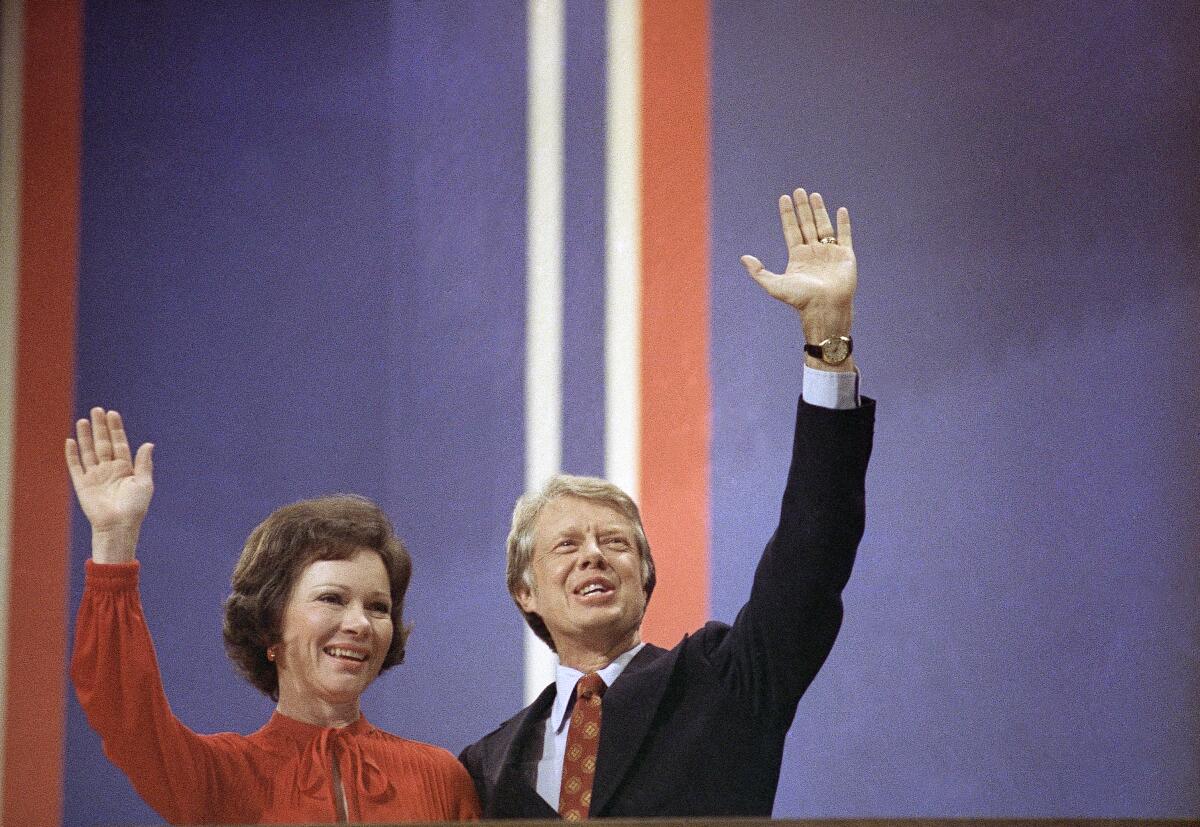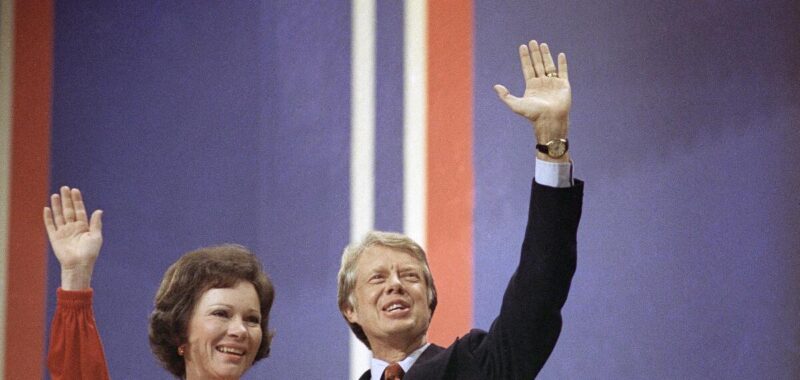Jimmy Carter wore a button-down shirt in Khartoum. It was a sweltering morning and the sun shone on the Nile as the clamorous city was rousing to life. Carter was in the Sudanese capital to monitor the 2010 election that was certain to extend the rule of autocrat Omar Hassan Ahmed Bashir, who had been indicted on international charges of crimes against humanity.
Carter was not deterred. He believed the first multiparty election in decades — no matter how flawed — would bring the war-scarred country closer to democracy. His blue eyes agleam, his trousers pressed, the former president, a wanderer accustomed to the planet’s cruel and harsh predicaments, offered coffee and pastries in his hotel room. He was optimistic but knew well what could happen when leaders with outsize ambitions controlled holy men and armies.
I was in town covering the story for The Times, and a representative from the Carter Center called and invited me to breakfast.
Carter, who died Sunday at 100, was president when I was a teenager. I knew him well from TV — that swoop of hair, Southern accent and disarming resolve that confronted a post-Watergate world of gas lines, inflation, the Iranian hostage crisis and a sense that America was adrift. His presidency had been much maligned. But his second act as humanitarian, house builder, Guinea worm exterminator and Nobel Peace Prize winner was a portrait of perseverance and grace.

Carter, with wife Rosalynn at the 1976 Democratic National Convention, was much-maligned for his presidency amid multiple crises, but went on to shine as a humanitarian.
(Associated Press)
An aide greeted me when I entered the hotel room. She quietly vanished. Carter walked in and sat on a small couch. Coffee was poured. A Danish slid onto a plate, a bit of fruit. Fishing boats were busy in the currents below and tea ladies dressed in plumes of colors stoked fires beneath blackened kettles on the corners.
Carter spoke about Sudan — its possibilities and dangers, and the fact that in coming months the country’s south, with its vast oil reserves, would hold an independence referendum on whether to secede from the north. Would Bashir relinquish the south to let it be governed by a former enemy in a cowboy hat, who presided over a territory with fewer than 100 miles of paved roads and a population that was 80% illiterate?
Carter knew the personalities and pitfalls, the egos and secrets, the maps and ledgers. He had traveled across Sudan; years earlier he‘d brokered a ceasefire in its civil war. He always went to the source, to places of refugees, poverty, disease and despair. To see and bear witness, much like the Bible school teacher he was back in Plains, Ga. He didn’t know what would happen. But he had hope.
The sun rose higher in the midmorning sky. The room quieted.
“You’re based in Cairo,” he said.
“Yes.”
He leaned closer.
“Tell me about things,” he said. “What’s happening?”
I felt like I was being quizzed by a man who had read countless dossiers and was intimate with the rise and fall of power. It was at once intimidating and bracing.
The restlessness and anger in the Arab world were nearing a breaking point that would erupt months later. Tunisia would ignite into nationwide protests. An uprising in Egypt would bring down President Hosni Mubarak. Tremors would spread from Syria and Yemen and from Libya to Bahrain. There were few inklings when we met of what would unfold, but the Middle East that Carter had spent so much time navigating was about to come undone yet again.
He mostly wanted to discuss the Palestinian-Israeli conflict and the possibilities, no matter how remote, of any progress toward reconciliation on that front. In 1978, Carter had held talks at Camp David with Israeli Prime Minister Menachem Begin and Egyptian President Anwar Sadat that would lead to a historic peace treaty. Carter believed then — apparently wrongly, given the problems that would come — that the pact would bring wider regional stability. And he hoped it would one day lead to a two-state solution for Israelis and Palestinians.

Carter celebrates in 1979 with Egyptian President Anwar Sadat, left, and Israeli Prime Minister Menachem Begin, right, after they signed a peace treaty Carter helped their nations reach.
(Associated Press)
Carter would later face criticism for his opinions on the issue. Many Jews and others were angered by his 2006 book, “Palestine Peace Not Apartheid,” which they saw as painting Israel as an aggressor and being overly sympathetic to Palestinians. Carter defended the book as well as his meetings with Hamas, which critics argued enhanced the stature of the militant group that the U.S. and Israel consider a terrorist organization. Carter later told an audience in Cairo that apartheid “is the exact description of what’s happening in Palestine now.”
But his vision remained focused, his commitment to peace unwavering. Three years later, in his book “We Can Have Peace in the Holy Land,” Carter wrote: “Everyone who engages in Middle East peacemaking is bound to make mistakes and suffer frustrations. Everyone must overcome the presence of hatred and fanaticism, and the memories of horrible tragedies. Everyone must face painful choices and failures in negotiations. Nevertheless, I am convinced that the time is ripe for peace in the region.”
It was questionable then, and appears no less easier now.
Carter had been in hospice since before Hamas attacked Israel on Oct. 7 and killed some 1,200 people. Israel has been retaliating with an ongoing bombardment of the Gaza Strip that health authorities there say has killed more than 45,000 Palestinians.
The Carter Center released a statement late last year saying: “The violence must stop now. There is no military solution to this crisis, only a political one that acknowledges the common humanity of both Israelis and Palestinians, respects the human rights of all, and creates a path for both societies to live side by side in peace.”
It would have been good to have heard Carter’s own voice, his Southern-inflected resolve and traveler’s wisdom.
What struck me most in that Khartoum hotel room were his empathy and his insatiable need to know. He was relentless in his pursuit, to track down threads and unfold scenarios, to follow the great maneuverings and go where needed — like to Sudan, where years earlier he‘d landed to try to help end fighting between Bashir’s troops and rebels who later ascended to power in a new country. Bashir was overthrown in 2019, and Sudan is again in turmoil.
It is difficult to mend the hard corners of the world. To find justice amid the stain of transgression. Carter’s gift was his capacity to wonder; to know the bitter truths and imagine something better.

